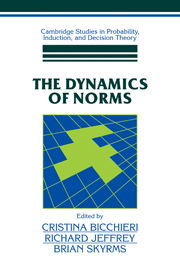The Structure of Values and Norms
Formal representations of values and norms are employed in several academic disciplines and specialties, such as economics, jurisprudence, decision theory, and social choice theory. Hansson has developed a unified formal representation of values and norms that reflects both their static and their dynamic properties. This formalized treatment, carried out in terms of both informal value theory and precise logical detail, will contribute to the clarification of certain issues in the basic philosophical theory of values and norms.
- Changes of both preferences and norms, not only their static properties, are analysed
- Offers explicit discussion of principles for formal representation
- Provides a unified approach to norms and values that is carried out both in terms of informal value theory and in considerable logical detail
Reviews & endorsements
"...specialist readers will appreciate the way that this publication provides them, in effect, with revised, coordinated and extended versions of the author's papers scattered in the journal literature." David Makinson, Mathematical Reviews
"Hansson's study is very clear... It is a dense and rich study, with an abundant set of formal terms, definitions, and theorems. It is a valuable study also for its numerous examples drawn from real life." Symbolic Logic
Product details
January 2005Adobe eBook Reader
9780511031694
0 pages
0kg
2 b/w illus. 4 tables
This ISBN is for an eBook version which is distributed on our behalf by a third party.
Table of Contents
- Preface
- Prolegomena:
- 1. Formalization
- Part I. Values:
- 2. Exclusionary preferences
- 3. Preference states
- 4. Changes in exclusionary preferences
- 5. Constructing combinative preferences
- 6. Pairwise combinative preferences
- 7. Decision-guiding combinative preferences
- 8. Monadic value predicates
- Part II. Norms:
- 9. A starting point for deontic logic
- 10. Situationist deontic logic
- 11. Conflicts and counterfactuals
- 12. Rules and normative systems
- 13. Legal relations
- Epilogue:
- 14. Afterthought
- Proofs
- References
- Index of symbols
- General index.






